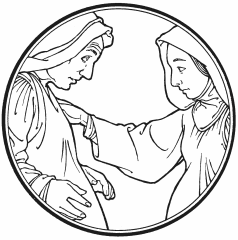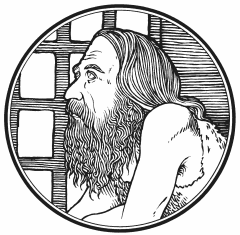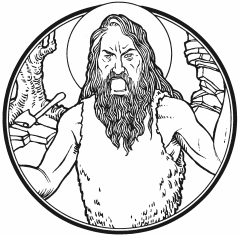 Grace, mercy, and peace to you from God our Father, and from our Lord and Savior, Jesus Christ, amen. The text for the sermon is the Gospel, which was read earlier.
Grace, mercy, and peace to you from God our Father, and from our Lord and Savior, Jesus Christ, amen. The text for the sermon is the Gospel, which was read earlier.
Women in our culture today are too often celebrated for what they look like instead of who they are. There are the advertisements that if women were only to take this pill or have that surgery, try this brand of cosmetics or join this exercise club, they could improve their appearance and look like all the women that grace the grocery store magazines.
In today’s Gospel reading, we meet two women. Luke never bothers to tell us what they look like. He doesn’t mention whether or not they are runway model material. He pays no attention to their sense of fashion. Nevertheless, he shows them for what they are: truly beautiful women.
The first woman that we meet in our text is a rather young woman, probably in her teens. Her name is Mary. She was betrothed, or engaged, to a man older than her by the name of Joseph, a carpenter by trade. This might have been a betrothal made in heaven, but there was a complication to all of this: Mary found herself with child. This did not occur because she cheated on her betrothed; rather, the angel proclaimed that her child would be conceived by the Holy Spirit. Mary, a virgin, had been chosen to be our Lord’s mother. And she received this news with beautiful humility: “Behold, I am the servant of the Lord.”
Following this exchange, the angel informed her that her cousin Elizabeth was also pregnant. Elizabeth, being much older than Mary, would have been an ideal mentor for her in her pregnancy so she plans a trip to Elizabeth to tell her of the good news.
Once the two women were together, Mary had to share the good news with her cousin. One can only imagine the sheer excitement that Mary had in telling Elizabeth, not wanting to leave out any of the details of what had transpired, for this truly was a miraculous event that had taken place and that would take place in the near future as well.
As Luke records for us, “And when Elizabeth heard the greeting of Mary, the baby leaped in her womb.” What an event this little interaction was between the offspring of Elizabeth and Mary’s announcement. John the Baptist was already pointing to the Lamb of God who would take away the sin of the world. John was already looking forward to what the child of Mary would accomplish.
What magnificent imagery we have so far in our text. We have a wonderful announcement from Mary to Elizabeth regarding the birth of the Savior of the world. John the Baptist leaps in the womb of Elizabeth upon Mary’s announcement. Mary and Elizabeth are rejoicing in the news. Then Elizabeth says something that changes the scene: “Blessed are you among women, and blessed is the fruit of your womb!”
Here you have a young pregnant teenager and now all of a sudden, she is blessed among women! And not only is she blessed among women, so is the child that she carries. I don’t know many pregnant teenage girls who are deemed blessed among women. In fact, there are those teenage mothers who would consider themselves anything but blessed among women. But Mary wasn’t considered blessed among women because of who she was or what she had done. Rather, she was blessed among women because God the Father had chosen her to be the bearer of the Word made flesh, Jesus Christ. Elizabeth praises the faith of Mary. Mary is the object of God’s blessing because God has visited her and she has responded in faith to God’s promises.
What clearly stands out is the presence of Jesus. Everything that happens is a response to the presence of God in the flesh – the baby inside Mary. The presence of the Lord causes a physical response by the child John in Elizabeth’s womb; the praising of Mary by Elizabeth, and Mary’s beautiful hymn that comes just a few verses later. Elizabeth proclaims Jesus in the womb of Mary to be cause of her blessedness, just as Christ in His Church is the source of her every blessing. Blessedness is a condition for which God alone is responsible. Mary’s blessedness is the result of an act of divine grace which God gives to her as a gift. Mary is blessed because of the presence of Christ in her just as the Church is blessed because Christ dwells in her.
As we look at Elizabeth and her words of blessing to Mary, how are we to understand them? Elizabeth says, “And blessed is she who believed that there would be a fulfillment of what was spoken to her from the Lord.” It refers to Mary’s faithful response to the angel: “Behold, I am the servant of the Lord; let it be to me according to your word.” Mary receives the word of the angel in faith and places herself in submission to that word. Elizabeth now affirms what Mary said to the angel.
Luke’s record of the Visitation is one that is filled with blessings and honor and glory. But of great importance here is faith. Mary has no proof other than faith in the words of the angel. Elizabeth has no proof except the faith that she has in Mary’s story of the events that brought her to her doorsteps. You and I have no proof other than God’s Word. Does this baby look like a Savior? Does He look like a king or Lord? Maybe all of this is just made up or maybe just dumb luck. Or, this could be how God desired His divine plan of salvation to work out for us.
Our Lord could have chosen to be born in beautiful Jerusalem or maybe even in glorious Rome. Instead, He chose to be born in lowly Bethlehem, the least among the cities of Judah. He could have chosen to enter into the family of the high priest or to be born into royalty. Instead, He chose to be born into the family of a carpenter with a poor young maiden as His mother. Beauty appears to be absent from this scene, especially when we look at the words of Isaiah: “He had no form or majesty that we should look at him, and no beauty that we should desire him.” But there lies the true beauty. This child would endure the ugliness of the cross, showing to us the true beauty of the Father’s will for us, His beloved children.
Our Lord did not choose to enter into some perfect and ideal world. He chose instead to enter our world, with all of its flaws and blemishes. Why? Because He loves us, with all of our flaws and blemishes. Yes, He comes to wash away the blemish of our sins. He presents us, His Church, as His Bride, clothed in baptismal splendor, without spot or wrinkle or any such thing, that we might be holy, without blemish. This is the true beauty of the incarnation, the true beauty of Christmas. In Jesus’ name, amen. Now the peace of God that passes all understanding, keep your hearts and minds through faith in Christ Jesus, amen.




